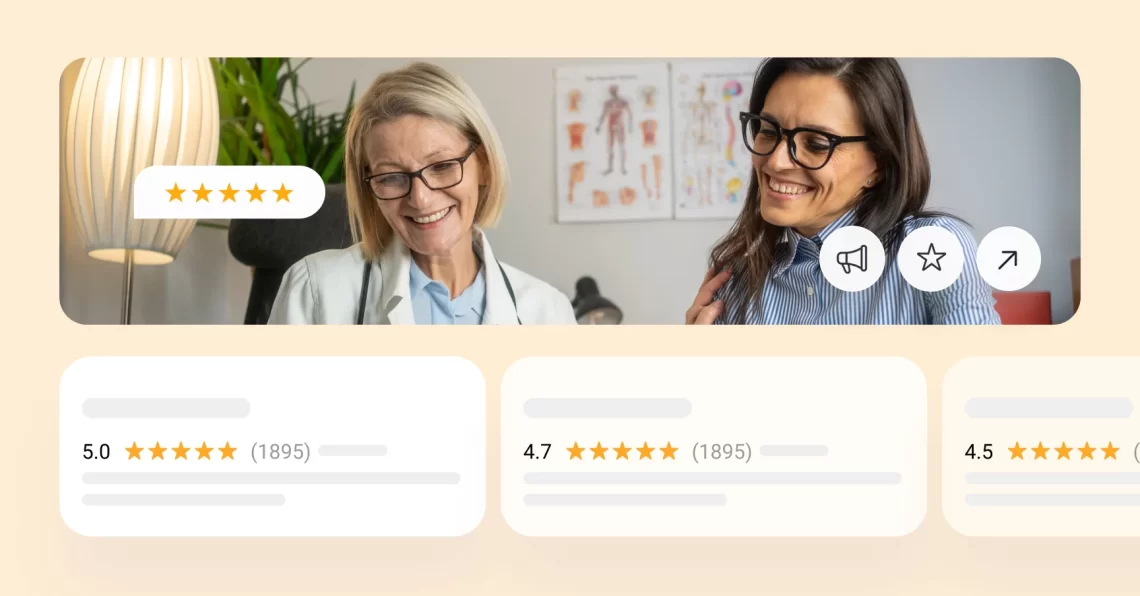Doctor reviews in Australia are becoming increasingly important in the healthcare decision-making process. With the rise of online platforms where patients can rate their doctors, more people are using these insights to assess healthcare providers before making appointments.
The Australian Medical Association (AMA) considers doctor reviews essential for preserving the integrity of the healthcare system and enhancing patient care. At the same time, it emphasizes the need for robust mechanisms to address concerns while upholding the professionalism of healthcare providers.
In this post, we’ll explore why doctor reviews in Australia matter, the challenges they present, and how they impact both patients and health practitioners.
Table of contents
- Why do doctor reviews matter?
- What are patients saying about their doctors?
- How reviews impact a doctor’s reputation
- Most medical practitioners find doctor rating websites fundamentally flawed
- The challenges of increasingly posting online reviews
- Who is using online rating sites?
- Why do patients trust doctor ratings
- What are your options if you are the subject of adverse comments?
- Reputation management strategies for doctors
- Can and should you respond online to a patient review?
- How to respond professionally
- Beware of advertising testimonials
- Conclusion
- Frequently asked questions on online doctor reviews by patients in Australia
- How Birdeye Reviews AI helps in managing doctor reviews
Why do doctor reviews matter?
Online reviews have become a crucial factor in how patients choose healthcare providers. Doctor review platforms like HealthEngine and RateMDs allow patients to:
- Leave feedback about their experiences
- Share their overall satisfaction with the care they received
- Rate their doctors on various factors such as communication, professionalism, and expertise
These reviews help foster transparency and reassure patients seeking a patient-centered healthcare provider.
Patient expectations and decision-making
Patients are increasingly turning to online physician rating sites reviews in Australia to choose doctors based on the experiences of others. Reviews can have a powerful impact:
- Positive reviews can enhance a doctor’s credibility and attract more patients.
- Negative reviews may discourage potential patients and lead them to seek alternatives.
Health-related consumer reviews help set patient expectations and significantly influence their decision-making when selecting a doctor.
What are patients saying about their doctors?
Patient reviews typically reflect positive or negative experiences based on the level of care they received. Here’s what patients commonly highlight:
Positive feedback often focuses on:
- Doctors who listen attentively
- Clear communication
- Empathy and understanding
- Effective treatment plans
Negative feedback usually centers around:
- Long wait times
- A lack of empathy
- Poor communication
- Dissatisfaction with treatment results
How reviews impact a doctor’s reputation
The feedback left by patients can significantly influence a doctor’s reputation. Key points include:
- Positive reviews boost a doctor’s professional image, increasing trust and patient inflow.
- Negative reviews can harm a doctor’s reputation, even if they don’t represent the doctor’s overall ability or care.
Doctors with consistent positive reviews will likely gain new patients, while negative reviews may drive patients away.
Most medical practitioners find doctor rating websites fundamentally flawed
While doctor reviews provide patients with helpful information, many healthcare professionals find physician rating website reviews flawed. Common criticisms include:
- Bias: Negative reviews may be more visible, overshadowing positive ones.
- Lack of context: Reviews often don’t explain the reasons behind a patient’s dissatisfaction, leading to misunderstandings.
- Anonymously post ratings: Reviews are typically anonymous, making it difficult to verify the authenticity of the feedback.
The challenges of increasingly posting online reviews
Interpreting reviews can be difficult because:
- Reviews often lack context or detailed explanations.
- Some feedback may be based on isolated incidents, which do not reflect the overall quality of care.
- Emotional or biased reviews may distort the true nature of a practitioner’s business.
Who is using online rating sites?
Doctor website rating sites are predominantly used by individuals looking for new healthcare providers or those seeking specific care. Patients who are most likely to use these websites include:
- Younger patients (ages 25-45) who are comfortable with technology and seek transparency.
- Patients with non-urgent medical needs or those looking for a new doctor.
- Patients seeking specialized care (e.g., dentists, GPs, specialists).
Why do patients trust doctor ratings
Patients value reviewed doctor rating sites because:
- Transparency: They provide insights into a doctor’s practice and patient experiences.
- Reassurance: Positive reviews can help patients feel confident in their choice of doctor.
- Shared experiences: Reviews allow patients to understand what to expect from a healthcare provider.
Learn Why Doctor Reviews in Australia Matter
Want to see the impact of Birdeye on your business? Watch the Free Demo Now.
Many patients—particularly younger, tech-savvy ones—use doctor review platforms to ensure they make informed choices about their healthcare providers.
What are your options if you are the subject of adverse comments?
If you’re a doctor who receives a negative review, consider these options:
- Respond politely: Acknowledge the patient’s feedback without being defensive.
- Seek clarification: If possible, contact the patient privately to understand their concerns better.
- Address underlying issues: Use the feedback as a tool to improve patient care.
Reputation management strategies for doctors
Doctors can manage their online reputation by:
- Encouraging positive reviews: Satisfied patients are likely to leave positive feedback.
- Responding professionally to negative reviews: Address concerns without escalating conflicts.
- Seeking continuous improvement: Use feedback to make changes and enhance patient experiences.
Managing your online reputation through professional online responses and continuous improvement can help protect your practice from the impact of negative reviews.
Can and should you respond online to a patient review?
Responding to reviews can be beneficial, but it must be done carefully. Benefits include:
- Improved trust: Responding shows you value patient feedback.
- Clarification: This allows you to address misunderstandings and clear up any confusion.
- Patient retention: A thoughtful response can help resolve conflicts and prevent patient loss.
However, it’s important to note that:
- Defensive responses can escalate situations and hurt your reputation.
- Public responses to sensitive issues may not always be an appropriate method.
How to respond professionally
When responding to reviews, follow these tips:
- Stay calm and respectful: Respond professionally, even to negative feedback.
- Acknowledge concerns: Show understanding and empathy for the patient’s experience.
- Offer solutions: Suggest ways to resolve or discuss the issue privately.
Beware of advertising testimonials
It’s crucial to distinguish between genuine reviews and those that may be paid or incentivized. Key points include:
- Authenticity: Ensure that reviews are left by actual patients and represent authentic experiences.
- Transparency: Avoid using fake or misleading testimonials, which could damage your reputation.
Ethical considerations of advertising testimonials
Using paid or fake testimonials is unethical and can harm your practice’s credibility. Consider the following:
- Honesty: Authentic reviews build trust with your patients.
- Transparency: Be transparent about how testimonials are gathered and used in marketing.
Authentic feedback is essential to maintaining a trustworthy reputation and building long-term patient relationships.
Conclusion
Doctor reviews in Australia are becoming an essential part of the healthcare decision-making process. While they provide transparency and valuable insights, these reviews also come with challenges for both patients and doctors.
For patients, reviews can sometimes be misleading, biased, or lack context, making it difficult to assess a doctor’s true capabilities. For doctors, online reviews pose reputation risks, privacy concerns, and the challenge of managing unrealistic patient expectations. Despite these challenges, doctor reviews continue to shape patient decisions and healthcare standards in Australia.
Doctors can build a strong online reputation and maintain patient trust by proactively managing positive and negative online reviews, responding professionally to feedback, and ensuring ethical marketing practices.
Frequently asked questions on online doctor reviews by patients in Australia
Doctor reviews are helpful, but they should be assessed carefully. Look for patterns and context in reviews to get a clearer picture of a doctor’s practice.
Yes, doctors can respond to online reviews professionally, ensuring privacy is maintained and addressing patient concerns respectfully.
Yes, doctor reviews are key in shaping a doctor’s reputation and can influence patient trust and decisions when choosing healthcare providers.
How Birdeye Reviews AI helps in managing doctor reviews
Managing doctor reviews can be challenging, especially with the constant influx of patient feedback. Birdeye’s Reviews AI provides an efficient solution to streamline this process, ensuring doctors can maintain a positive online reputation without the added stress.
Here’s how Birdeye Reviews AI can help:
- Effortless review collection: Birdeye integrates with your CRM, making it easy to collect reviews from patients automatically. This eliminates manual follow-ups, saving time and ensuring your online presence stays up-to-date.
- Gen AI-generated responses with a single click: Birdeye’s Gen AI can generate personalized, error-free responses to reviews with just a single click. Whether a review is positive or negative, the system tailors the response to suit the situation, ensuring your reply is professional and thoughtful.
- Maintain professionalism in responses: Gen AI-driven replies help doctors respond to feedback quickly, maintaining professionalism even in challenging situations. This ensures that your responses reflect empathy, respect, and a commitment to patient care.
- Save time and improve efficiency: Birdeye automates the response process, saving doctors time. This allows them to focus more on patient care and less on managing reviews. The tool also ensures consistency in responses, crucial for maintaining a cohesive online presence.
- Enhance patient trust and engagement: Quick, personalized responses to patient feedback show that you value their input, helping build stronger patient relationships. This transparency can lead to higher patient satisfaction and increased trust.
Birdeye Reviews AI offers an effective and efficient way for doctors to manage their online reputation. Automating review collection and providing Gen AI-generated responses helps doctors maintain a professional, consistent presence online. This allows doctors to focus on delivering quality care while strengthening patient relationships and trust.

Originally published









